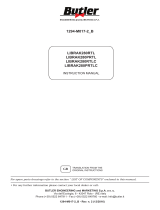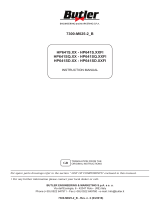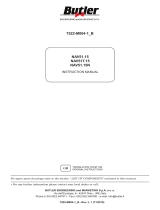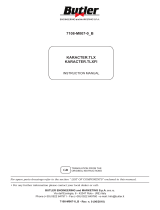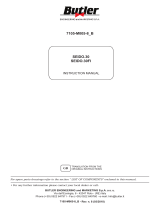Page is loading ...

INSTRUCTION MANUAL
• For any further information please contact your local dealer or call:
GB
For spare parts drawings refer to the section “ LIST OF COMPONENTS” enclosed to this manual.
TRANSLATION FROM THE
ORIGINAL INSTRUCTIONS
1297-M021-1_B
1297-M021-1_B
LIBRAK380.3DTEC
LIBRAK380P.3DTEC
LIBRAK430.3DTEC
LIBRAK430P.3DTEC
BUTLER ENGINEERING and MARKETING S.p.A. a s. u.
Via dell’Ecologia, 6 - 42047 Rolo - (RE) Italy
Phone (+39) 0522 647911 - Fax (+39) 0522 649760 - e-mail: Info@butler.it
- Rev. n. 1 (12/2016)

GB
Page 2 of 62
INSTRUCTION, USE AND
MAINTENANCE MANUAL
SUMMARY
SYMBOLS USED IN THE MANUAL AND ON
THE MACHINE __________________________ 6
1.0 GENERAL INTRODUCTION _________ 8
1.1 Introduction ___________________________8
2.0 INTENDED USE ____________________ 8
2.1 Staff training __________________________8
3.0 SAFETY DEVICES __________________ 9
3.1 Residual risks _________________________9
4.0 GENERAL SAFETY RULES _________ 9
5.0 PACKING AND MOBILIZATION
FOR TRANSPORT _________________ 10
6.0 UNPACKING _______________________ 11
7.0 MOBILIZATION ____________________ 11
8.0 WORKING ENVIRONMENT
CONDITIONS ______________________ 11
8.1 Working area ________________________ 11
8.2 Lighting _____________________________ 12
9.0 MACHINE ASSEMBLY _____________ 12
9.1 Anchoring system ___________________ 12
9.2 Fixtures contained in the packing ___ 13
9.3 Assembly procedures ________________ 14
9.3.1 Fitting the mandrel on the flange _ 14
9.3.2 Fitting and removal of the
pneumatic mandrel on the
flange ___________________________ 14
9.3.3 Fitting the protection guard _____ 16
9.3.4 Monitor fitting
(LIBRAK380.3DTEC -
LIBRAK380P.3DTEC) ____________ 16
9.3.5 Monitor fitting
(LIBRAK430.3DTEC -
LIBRAK430P.3DTEC) ____________ 17
10.0 ELECTRICAL CONNECTION _______ 17
10.1 Electrical checks ____________________ 18
11.0 AIR CONNECTIONS _______________ 18
12.0 FITTING THE WHEEL ON THE
MANDREL _________________________ 19
12.1 Fitting of the wheel
(LIBRAK380.3DTEC -
LIBRAK430.3DTEC) _________________ 19
12.2 Fitting of the wheel
(LIBRAK380P.3DTEC -
LIBRAK430P.3DTEC) ________________ 20
12.3 Ultrasound sensor support
adjustment __________________________ 22
12.4 Correct positioning of the device
during the Run-out detection tyre
outer side (Optional) ________________ 22
13.0 CONTROL PANEL _________________ 23
14.0 WHEEL BALANCING ______________ 23
14.1 Switching the machine on and off ___ 23
14.2 Balancing programs setting _________ 25
14.2.1 Use of the machine automatic
system __________________________ 25
14.2.2 Programs setting through
“Measurement being
acquired” screen page ___________ 29
14.3 Indicative display of points where
to detect measures/to fit weight _____ 30
14.3.1 Weights positioning _____________ 30
14.4 Displaying the active/modifiable
field _________________________________ 30
14.5 Wheel balancing screen page
description __________________________ 30
14.5.1 Balancing mode _________________ 32
14.6 Standard balancing programs_______ 33
14.6.1 Static____________________________ 33
14.6.2 Static-1 __________________________ 34
14.6.3 Static-2 __________________________ 34
14.6.4 Dynamic_________________________ 34
14.6.5 ALU-S ___________________________ 34
14.6.6 ALU-S1 __________________________ 35
14.6.7 ALU-S2 __________________________ 35
14.6.8 ALU-1 ____________________________ 35
14.6.9 ALU-2 ____________________________ 35
14.6.10 ALU-3 __________________________ 36
14.6.11 ALU-4 __________________________ 36
14.7 Optional balancing programs _______ 36
14.7.1 ECO-WEIGHT mode ______________ 36
14.7.2 SPLIT mode _____________________ 38
14.7.3 Weights hidden behind spokes
mode ____________________________ 40
14.7.4 Matching mode __________________ 41
14.8 Special balancing programs _________ 44
14.8.1 Pax ______________________________ 44
14.9 Recalculation Function ______________ 44
14.10 Procedures for electronic RUN-OUT
measuring (tyre outer side)
(Optional) ___________________________ 44
15.0 USER MENU (OPTIONS AND
CALIBRATION) ____________________ 45
15.1 Options menu ________________________ 46
15.1.1 Lower weight limit ______________ 48
LIBRAK380.3DTEC - LIBRAK380P.3DTEC - LIBRAK430.3DTEC - LIBRAK430P.3DTEC
1297-M021-1_B

INSTRUCTION, USE AND
MAINTENANCE MANUAL
GB
Page 3 of 62
15.1.2 Setting adhesive weight
dimensions and static threshold
percentage ______________________ 48
15.1.3 User management _______________ 49
15.2 Machine calibration _________________ 50
15.2.1 Mandrel “0” (zero) calibration ___ 50
15.2.2 Weight measurement sensors
calibration ______________________ 50
15.2.3 Touch monitor calibration _______ 51
16.0 ERROR SIGNALS __________________ 52
17.0 ROUTINE MAINTENANCE _________ 53
18.0 TECHNICAL DATA _________________ 54
18.1 Dimensions __________________________ 55
19.0 STORING __________________________ 57
20.0 SCRAPPING _______________________ 57
21.0 REGISTRATION PLATE DATA _____ 57
22.0 FUNCTIONAL DIAGRAMS _________ 57
Table A -
Wiring connection diagram
(LIBRAK380.3DTEC -
LIBRAK380P.3DTEC _____________ 58
Table B -
Wiring connection diagram
(LIBRAK430.3DTEC -
LIBRAK430P.3DTEC _____________ 60
Table C - Pneumatic connection
diagram
(LIBRAK380P.3DTEC -
LIBRAK430P.3DTEC) _____________ 62
23.0 LIST OF COMPONENT
1297-M021-1_B
LIBRAK380.3DTEC - LIBRAK380P.3DTEC - LIBRAK430.3DTEC - LIBRAK430P.3DTEC

GB
Page 4 of 62
INSTRUCTION, USE AND
MAINTENANCE MANUAL
LIBRAK380.3DTEC - LIBRAK380P.3DTEC - LIBRAK430.3DTEC - LIBRAK430P.3DTEC
1297-M021-1_B
KEY
1 – Weight holding bridge
2 – Pneumatic mandrel (only for LIBRAK380P.3DTEC model)
3 – Ultrasound sensor
4 – Threaded mandrel (only for LIBRAK380.3DTEC model)
5 – Protection guard
6 – Foot brake (only for LIBRAK380.3DTEC model) / pneumatic mandrel open-close foot brake pedal
(only for LIBRAK380P.3DTEC model)
7 – Main switch
8 – Laser sensor
9 – Led light unit
10 – Monitor
11 – Pusher ring
12 – Rapid ring nut (only for LIBRAK380.3DTEC models)
13 – Locking sleeve (only for LIBRAK380P.3DTEC models)
14 – Cones
15 – Lateral guard
16 – Push-button panel with 7 keys
17 – Tyre outer side electronic RUN-OUT measuring device (optional)
Fig. 1 - LIBRAK380.3DTEC - LIBRAK380P.3DTEC

INSTRUCTION, USE AND
MAINTENANCE MANUAL
GB
Page 5 of 62
1297-M021-1_B
LIBRAK380.3DTEC - LIBRAK380P.3DTEC - LIBRAK430.3DTEC - LIBRAK430P.3DTEC
KEY
1 – Weight holding bridge
2 – Pneumatic mandrel (only for LIBRAK430P.3DTEC model)
3 – Ultrasound sensors
4 – Threaded mandrel (only for LIBRAK430.3DTEC model)
5 – Protection guard
6 – Foot brake (only for LIBRAK430.3DTEC model) / pneumatic mandrel open-close foot brake pedal
(only for LIBRAK430P.3DTEC model)
7 – Main switch
8 – Laser sensor
9 – Led light unit
10 – Touch-screen
11 – Pusher ring
12 – Rapid ring nut (only for LIBRAK430.3DTEC models)
13 – Locking sleeve (only for LIBRAK430P.3DTEC models)
14 – Cones
15 – Lateral guard
16 – Tyre outer side electronic RUN-OUT measuring device (optional)
Fig. 2 - LIBRAK430.3DTEC - LIBRAK430P.3DTEC

GB
Page 6 of 62
INSTRUCTION, USE AND
MAINTENANCE MANUAL
SYMBOLS USED IN THE MANUAL AND ON THE MACHINE
Symbols Description
B2167000
Read instruction manual.
FORBIDDEN!
Wear work gloves.
Wear work shoes.
B2167000
Wear safety earcaps.
99990758
Shock hazard.
Caution: hanging loads.
Mandatory. Operations or jobs to
be performed compulsorily.
Danger! Be particularly careful.
Symbols Description
Move with fork lift truck or pallet
truck.
Lift from above.
B1541000
General danger.
Wear safety goggles.
Technical assistance necessary.
Do not perform any intervention.
Warning. Be particularly careful
(possible material damages).
Note. Indication and/or useful
information.
Attention: never lift the machine
by means of the mandrel.
99990114
Arrow plate.
999912940
LIBRAK380.3DTEC - LIBRAK380P.3DTEC - LIBRAK430.3DTEC - LIBRAK430P.3DTEC
1297-M021-1_B

INSTRUCTION, USE AND
MAINTENANCE MANUAL
GB
Page 7 of 62
INFORMATION PLATE LOCATION TABLE
IF ONE OR MORE PLATES DISAPPEARS FROM THE MACHINE OR BECOMES DIFFICULT
TO READ. REPLACE IT AND QUOTE ITS/THEIR CODE NUIMBER/S WHEN REORDERING.
1297-M021-1_B
LIBRAK380.3DTEC - LIBRAK380P.3DTEC - LIBRAK430.3DTEC - LIBRAK430P.3DTEC
Code numbers of plates
99990114 Arrow plate
99990758 Electricity danger plate
999910050 Protection device use plate
999912940 Lifting plate
999914160 Voltage 230V 50/60 Hz 1 Ph plate
999914170 Voltage 115V 50/60 Hz 1 Ph plate
999916311 Rubbish skip label
999920540 Laser point danger plate
999919910 Machine nameplate (only for LIBRAK380.3DTEC - LIBRAK380P.3DTEC)
999919900 Machine nameplate (only for LIBRAK430.3DTEC - LIBRAK430P.3DTEC)
• Serial number plate
* Manufacturer nameplate

GB
Page 8 of 62
INSTRUCTION, USE AND
MAINTENANCE MANUAL
SOME OF THE PICTURES AND/
OR DISPLAY SCREEN PAGES
PRESENT IN THIS MANUAL HAVE
BEEN OBTAINED FROM PICTURES
OF PROTOTYPES, THEREFORE
THE STANDARD PRODUCTION MA-
CHINES AND ACCESSORIES CAN
BE DIFFERENT IN SOME COMPO-
NENTS/DISPLAY SCREEN PAGES.
1.0 GENERAL INTRODUCTION
This manual is an integral part of the product and
must be retained for the whole operating life of the
machine.
Carefully study the warnings and instructions con-
tained in this manual. It contains important instruc-
tions regarding FUNCTIONING, SAFE USE and
MAINTENANCE.
KEEP THE MANUAL IN A KNOWN,
EASILY ACCESSIBLE PLACE FOR
ALL ACCESSORY OPERATORS
TO CONSULT IT WHENEVER IN
DOUBT.
THE MANUFACTURER DISCLAIMS
ALL RESPONSIBILITY FOR ANY
DAMAGE OCCURRED WHEN THE
INDICATIONS GIVEN IN THIS
MANUAL ARE NOT RESPECTED:
AS A MATTER OF FACT, THE NON-
COMPLIANCE WITH SUCH INDI-
CATIONS MIGHT LEAD TO EVEN
SERIOUS DANGERS.
1.1 Introduction
Thank you for preferring this wheel balancer. We feel
sure you will not regret your decision.
This machine has been designed for use in profes-
sional workshops and stands out for its reliability
and easy, safe and rapid operation. With just a small
degree of maintenance and care, this wheel balancer
will give you many years of trouble-free service and
lots of satisfaction.
LIBRAK380.3DTEC - LIBRAK380P.3DTEC - LIBRAK430.3DTEC - LIBRAK430P.3DTEC
1297-M021-1_B
2.0 INTENDED USE
The machines models LIBRAK380.3DTEC -
LIBRAK380P.3DTEC - LIBRAK430.3DTEC -
LIBRAK430P.3DTEC, and relative versions, are
wheel balancers for car and light transport, pro-
jected to be used exclusively to cancel out, or at
least reduce to acceptable limits the vibrations of
the wheels, by fitting counterweights of suitable size
and in specific positions to the same wheels that are
not correctly balanced.
THIS MACHINE MUST BE USED
STRICTLY FOR THE INTENDED
PURPOSE IT WAS DESIGNED FOR
(AS INDICATED IN THIS MANUAL).
THE MANUFACTURER CANNOT
BE HELD RESPONSIBLE FOR ANY
DAMAGE CAUSED BY IMPROPER,
ERRONEOUS, OR UNACCEPTABLE
USE.
AN INTENSIVE USE OF THE EQUIP-
MENT IN INDUSTRIAL ENVIRON-
MENT IS NOT RECOMMENDED.
2.1 Staff training
The machine may be operated only by suitably
trained and authorized personnel.
Given the complexity of the operations necessary to
manage the machine and to carry out the operations
safely and efficiently, the personnel must be trained
in such a way that they learn all the information
necessary to operate the machine as intended by the
manufacturer.
A CAREFUL READING OF THIS
INSTRUCTION MANUAL FOR
USE AND MAINTENANCE AND A
SHORT PERIOD OF TRAINING
WITH SKILLED PERSONNEL CAN
BE AN ENOUGH PREVENTIVE
PREPARATION.

INSTRUCTION, USE AND
MAINTENANCE MANUAL
GB
Page 9 of 62
3.0 SAFETY DEVICES
PERIODICALLY, AT LEAST MONTH-
LY, CHECK THE INTEGRITY AND
THE FUNCTIONALITY OF THE
SAFETY AND PROTECTION DE-
VICES ON THE MACHINE.
• Master switch positioned on the rear of the ma-
chine
Its function is to disconnect machine electric supply.
• Protection guard
Its function is to protect the operator from possible
projections of materials on the wheel during its spin.
Wheel spinning is normally prevented if the wheel
protection guard is raised (open). When the
protection guard is open, this interrupts the cir-
cuit that triggers the motor and automatic start
is prevented, including in the case of an error.
Press
stop key to stop wheel rotation in
emergency conditions.
3.1 Residual risks
The machine was subjected to a complete analysis of
risks according to reference standard EN ISO 12100.
Risks are as reduced as possible in relation with tech-
nology and product functionality.
Possible residual risks have been emphasized through
pictorial representations and warnings which placing is
indicated in “ PLATE POSITIONING TABLE” at page 7.
4.0 GENERAL SAFETY RULES
• Any tampering with or modification to the machine
not previously authorized by the manufacturer ex-
empts the latter from all responsibility for damage
caused by or derived from said actions.
• Removing of or tampering with the safety devices or
with the warning signals placed on the machine leads
to serious dangers and represents a transgression of
European safety rules.
• Use of the machine is only permitted in places free
from explosion or fire hazard and in dry places
under cover.
• Original spare parts and accessories should be used.
THE MANUFACTURER CANNOT
BE HELD RESPONSIBLE FOR ANY
DAMAGE CAUSED BY IMPROPER,
ERRONEOUS, OR UNACCEPTABLE
USE.
• Installation must be conducted only by qualified
personnel exactly according to the instructions that
are given below.
• Ensure that there are no dangerous situations dur-
ing the machine operating manoeuvres. Immediately
stop the machine if it miss-functions and contact the
assistance service of an authorized dealer.
• In emergency situations and before carrying out any
maintenance or repairs, disconnect all supplies to
the machine by using the main switch, placed on the
machine itself, and unplugging the power supply.
• The machine electrical supply system must be
equipped with an appropriate earthing, to which
the yellow-green machine protection wire must be
connected.
• Ensure that the work area around the machine is free
of potentially dangerous objects and that there is no
oil since this could damage the tyre. Oil on the floor
is also a potential danger for the operator.
• UNDER NO CIRCUMSTANCES must the machine be
used to spin anything but vehicle wheels. Bad locking
can cause rotating parts to come loose, with potential
damage to the machine and anything in the vicinity
and injury to the operator.
1297-M021-1_B
LIBRAK380.3DTEC - LIBRAK380P.3DTEC - LIBRAK430.3DTEC - LIBRAK430P.3DTEC

GB
Page 10 of 62
INSTRUCTION, USE AND
MAINTENANCE MANUAL
OPERATORS MUST WEAR SUIT-
ABLE WORK CLOTHES, PROTEC-
TIVE GLASSES AND GLOVES,
AGAINST THE DANGER FROM
THE SPRAYING OF DANGEROUS
DUST, AND POSSIBLY LOWER
BACK SUPPORTS FOR THE LIFT-
ING OF HEAVY PARTS. DANGLING
OBJECTS LIKE BRACELETS MUST
NOT BE WORN, AND LONG HAIR
MUST BE TIED UP. FOOTWEAR
SHOULD BE ADEQUATE FOR THE
TYPE OF OPERATIONS TO BE CAR-
RIED OUT.
• The machine handles and operating grips must be
kept clean and free from oil.
• The workshop must be kept clean and dry. Make sure
that the working premises are properly lit.
The machine can be operated by a single operator.
Unauthorized personnel must remain outside the
working area, as shown in Fig. 4.
Avoid any hazardous situations. Do not use air-
operated or electrical equipment when the shop is
damp or the floor slippery and do not expose such
tools to atmospheric agents.
• When operating and servicing this machine, carefully
follow all applicable safety and accident-prevention
precautions.
The machine must not be operated by professionally
unskilled persons.
WHEN USING THE MODELS WITH
WHEEL PNEUMATIC CLAMPING,
DURING MANDREL OPENING/
CLOSING OPERATIONS, BE EX-
TREMELY CAREFUL AND KEEP
YOUR HANDS OR OTHER PARTS
OF YOUR BODY AWAY FROM THE
MOVING MANDREL.
LIBRAK380.3DTEC - LIBRAK380P.3DTEC - LIBRAK430.3DTEC - LIBRAK430P.3DTEC
1297-M021-1_B
5.0 PACKING AND MOBILIZATION
FOR TRANSPORT
HAVE THE MACHINE HANDLED BY SKILLED
PERSONNEL ONLY.
THE LIFTING EQUIPMENT MUST WITHSTAND
A MINIMUM RATED LOAD EQUAL TO THE
WEIGHT OF THE PACKED MACHINE (SEE
PARAGRAPH “TECHNICAL SPECIFICATIONS”).
The machine is packed completely assembled.
The machine is inside a carton box which size is
1070x950x1340 mm (for models LIBRAK380.3DTEC
- LIBRAK380P.3DTEC) and 1300x1000x1150 mm (for
models LIBRAK430.3DTEC - LIBRAK430P.3DTEC).
Movement must be by pallet-lift or fork-lift trolley.
The fork lifting points are indicated on the packing.
Fig. 3

INSTRUCTION, USE AND
MAINTENANCE MANUAL
GB
Page 11 of 62
1297-M021-1_B
LIBRAK380.3DTEC - LIBRAK380P.3DTEC - LIBRAK430.3DTEC - LIBRAK430P.3DTEC
6.0 UNPACKING
DURING UNPACKING, ALWAYS
WEAR GLOVES TO PREVENT ANY
INJURY CAUSED BY CONTACT
WITH PACKAGING MATERIAL
(NAILS, ETC.).
The cardboard box is supported with plastic strapping.
Cut the strapping with suitable scissors. Use a small
knife to cut along the lateral axis of the box and open
it like a fan.
It is also possible to unnail the cardboard box from
the pallet it is fixed to. After removing the packing, and
in the case of the machine packed fully assembled,
check that the machine is complete and that there is
no visible damage.
If in doubt do not use the machine and refer to pro-
fessionally qualified personnel (to the seller).
The packing (plastic bags, expanded polystyrene, nails,
screws, timber, etc.) should not be left within reach of
children since it is potentially dangerous. These ma-
terials should be deposited in the relevant collection
points if they are pollutants or non biodegradable.
THE BOX CONTAINING THE FIX-
TURES IS CONTAINED IN THE
WRAPPING. DO NOT THROW IT
AWAY WITH THE PACKING.
7.0 MOBILIZATION
THE LIFTING EQUIPMENT MUST WITHSTAND
A MINIMUM RATED LOAD EQUAL TO THE
WEIGHT OF THE MACHINE (SEE PARAGRAPH
TECHNICAL SPECIFICATIONS). DO NOT AL-
LOW THE LIFTED MACHINE TO SWING.
NEVER LIFT THE MACHINE BY MEANS OF THE
MANDREL.
If the machine has to be moved from its normal work
post, the movement must be conducted following the
instructions listed below.
• Protect the exposed corners with suitable material
(Pluribol/cardboard).
• Do not use metallic cables for lifting.
• Make sure the electrical supply (and, for
LIBRAK380P.3DTEC - LIBRAK430P.3DTEC mod-
els, the pneumatic supply) of the machine is not
connected.
• Place again the machine onto the original pallet with
whom it was delivered.
• Use transpallet or fork-lift for handling.
8.0 WORKING ENVIRONMENT CONDI-
TIONS
The machine must be operated under proper condi-
tions as follows:
• temperature: 0° + 45° C
• relative humidity: 30 - 90% (dew-free)
• atmospheric pressure: 860 - 1060 hPa (mbar).
The use of the machine in ambient conditions other
than those specified above is only allowed after prior
agreement with and approval of the manufacturer.
8.1 Working area
Fig. 4
600
600
600
600
600
600
LIBRAK380.3DTEC - LIBRAK380P.3DTEC
LIBRAK430.3DTEC - LIBRAK430P.3DTEC

GB
Page 12 of 62
INSTRUCTION, USE AND
MAINTENANCE MANUAL
USE THE MACHINE INDOORS OR IN A ROOFED
AREA. PLACE OF INSTALLATION MUST BE
DRY, ADEQUATELY LIT AND IN COMPLIANCE
WITH APPLICABLE SAFETY REGULATIONS.
The location of the machine requires a usable space
as indicated in Fig. 4. The positioning of the machine
must be according to the distances shown. From the
control position the operator is able to observe all the
machine and surrounding area. He must prevent unau-
thorized personnel or objects that could be dangerous
from entering the area.
The machine must be fixed on a flat floor surface,
preferably of cement or tiled. Avoid yielding or irregu-
lar surfaces.
The base floor must be able to support the loads trans-
mitted during operation.
This surface must have a strength of at least 500 kg/m².
The depth of the solid floor must be sufficient to guar-
antee that the anchoring bolts hold.
8.2 Lighting
The machine does not require its own lighting for
normal working operations. However, it must be used
in an adequately lit environment.
In case of poor lighting use lamps having total power
800/1200 Watt.
9.0 MACHINE ASSEMBLY
After having freed the various components from the
packing check that they are complete, and that there
are no anomalies, then comply with the following in-
structions for the assembly of the components making
use of the attached series of illustrations.
9.1 Anchoring system
The packed machine is fixed to the support pallet
through the holes prearranged on the frame. Such
holes can be used also to fix the machine to the ground,
through floor anchor small blocks (excluded from sup-
ply). Before carrying out the definitive fixing, check that
all the anchor points are laid down flat and correctly
in contact with the fixing surface itself. If not so, insert
shimming profiles between the machine and the fixing
lower surface, as indicated in Fig. 5.
IN CASE OF WHEEL WEIGHING
MORE THAN 30 KG, IT IS COM-
PULSORY TO FIX TO THE GROUND
BY MEANS OF SCREW ANCHORS.
X
b
a
X
1
X
c
X
X
Fig. 5
LIBRAK380.3DTEC
LIBRAK380P.3DTEC
LIBRAK430.3DTEC
LIBRAK430P.3DTEC
a= 374 a= 374
b= 686.5 b= 762
c= 686.5
LIBRAK380.3DTEC - LIBRAK380P.3DTEC - LIBRAK430.3DTEC - LIBRAK430P.3DTEC
1297-M021-1_B

INSTRUCTION, USE AND
MAINTENANCE MANUAL
GB
Page 13 of 62
1300A004
999072
129571492
GAR111
GAR101
GAR108
A
Fig. 6
THE GRIP-RING (FIG. 6 REF. A)
MUST BE MOUNTED WITH THE
TEETH OR DISCHARGE SIDE
TOWARDS THE RING-NUT OR
SLEEVE (SEE FIG. 6).
1297-M021-1_B
LIBRAK380.3DTEC - LIBRAK380P.3DTEC - LIBRAK430.3DTEC - LIBRAK430P.3DTEC
• Execute 4 holes with 10 mm diameter on the floor
by the holes on the bottom floor;
• insert the small blocks (excluded from supply) into
the holes;
• fix the machine to the ground with 4 M8x80 mm
screws (excluded from supply) (Fig. 5 ref. 1) (or
with 4 8x80 mm stud bolts (excluded from supply)).
Tighten the screws with an approximate tightening
torque of 70 Nm.
9.2 Fixtures contained in the packing
The packing case contains also the fixtures box.
Check that all the parts listed below are there (see
Fig. 6).
For LIBRAK380.3DTEC - LIBRAK430.3DTEC mod-
els
Code Description N.
GAR101 Rapid ring nut + pusher ring 1
GAR111 Cones + protection cup 1
129571492 Manual external data gauge 1
1300A004 Weight pliers 1
999072 Carriages counterweight 1
For LIBRAK380P.3DTEC - LIBRAK430P.3DTEC
models
Code Description N.
GAR108 Rapid ring nut + pusher ring 1
GAR111 Cones + protection cup 1
129571492 Manual external data gauge 1
1300A004 Weight pliers 1
999072 Carriages counterweight 1

GB
Page 14 of 62
INSTRUCTION, USE AND
MAINTENANCE MANUAL
LIBRAK380.3DTEC - LIBRAK380P.3DTEC - LIBRAK430.3DTEC - LIBRAK430P.3DTEC
1297-M021-1_B
9.3 Assembly procedures
9.3.1 Fitting the mandrel on the flange
Only for LIBRAK380.3DTEC - LIBRAK430.3DTEC
models
Screw the mandrel with an Allen wrench (Fig. 7 ref. 1)
on the flange (Fig. 7 ref. 2).
1
2
Fig. 7
9.3.2 Fitting and removal of the pneumatic
mandrel on the flange
Only for LIBRAK380P.3DTEC -
LIBRAK430P.3DTEC models
FITTING
1. After making power and air connections switch on
the machine (the pneumatic mandrel always opens
when the machine is switched on). Switch the ma-
chine off. Fit the internal mandrel on the flange
and tighten it with the wrench provided (Fig. 8
and Fig. 9).
Fig. 8
Fig. 9

INSTRUCTION, USE AND
MAINTENANCE MANUAL
GB
Page 15 of 62
2. Press the brake's pedal and, at the same time, tighten
the internal mandrel as far as it will go using the
wrench provided (Fig. 10).
Fig. 10
3. Fit the external mandrel and tighten it manually
(Fig. 11).
Fig. 11
4. Close the pneumatic mandrel by means of the pedal
to access the key socket (Fig. 12).
Fig. 12
5. Press the brake pedal and at the same time block
the external mandrel using the wrench supplied
(Fig. 13).
Fig. 13
REMOVAL
• Close the pneumatic mandrel by means of the pedal
to access the key socket (Fig. 12).
• Press the brake pedal and at the same time release
the external mandrel by using the wrench provided
(Fig. 13).
• Remove the external mandrel, open the pneumatic
mandrel by means of the pedal provided and loosen the
internal mandrel using the special wrench (Fig. 10).
1297-M021-1_B
LIBRAK380.3DTEC - LIBRAK380P.3DTEC - LIBRAK430.3DTEC - LIBRAK430P.3DTEC

GB
Page 16 of 62
INSTRUCTION, USE AND
MAINTENANCE MANUAL
9.3.3 Fitting the protection guard
1. Mount the protection guard (Fig. 14 ref. 1) to the
support (Fig. 14 ref. 2) using the screws (Fig. 14
ref. 3), interposing the Belleville washers (Fig. 14
ref. 4) and the tab washers (Fig. 14 ref. 5 - 6).
2. Tighten the screws (Fig. 14 ref. 3) in order to make
the guard (Fig. 14 ref. 1) lift or lower without
bumping against the limit switch. Carry out the
adjustment so that it's possible to manually guide
the guard both during closing and opening.
DURING GUARD'S ASSEMBLY,
PAY ATTENTION TO THE MICRO
PLACED INSIDE THE MACHINE.
3. Connect the ultrasound sensor cable (Fig. 14 ref. 7)
of the automatic width measuring device (Fig. 14
ref. 9) to the pre-arranged connector (Fig. 14
ref. 8).
Fig. 14
LIBRAK380.3DTEC - LIBRAK380P.3DTEC - LIBRAK430.3DTEC - LIBRAK430P.3DTEC
1297-M021-1_B
9.3.4 Monitor fitting (LIBRAK380.3DTEC -
LIBRAK380P.3DTEC)
1. Fit the monitor support plate (Fig. 15 ref. 1) to
the monitor support (Fig. 15 ref. 2) using the
washers (Fig. 15 ref. 3) and the issued screws
(Fig. 15 ref. 4).
Fit the monitor (Fig. 15 ref. 5) and the keyboard
guard (Fig. 15 ref. 6) to the plate (Fig. 15 ref. 1)
using the washers (Fig. 15 ref. 7), the screws
(Fig. 15 ref. 8) and (Fig. 15 ref. 9) on issue.
Mount the guard (Fig. 15 ref. 10) to the monitor
support plate (Fig. 15 ref. 1) with the washers
(Fig. 15 ref. 11) and the screws (Fig. 15 ref. 12)
supplied.
4
3
1
2
3
5
6
7
7
8
8
9
10
11
11
12
12
Fig. 15

INSTRUCTION, USE AND
MAINTENANCE MANUAL
GB
Page 17 of 62
10.0 ELECTRICAL CONNECTION
EVEN THE TINIEST PROCEDURE
OF AN ELECTRICAL NATURE
MUST BE CARRIED OUT BY PRO-
FESSIONALLY QUALIFIED STAFF.
BEFORE CONNECTING THE MA-
CHINE MAKE SURE THAT:
• THE MAIN POWER RATING COR-
RESPONDS TO THE MACHINE
RATING AS SHOWN ON THE
MACHINE PLATE;
• ALL MAIN POWER COMPO-
NENTS ARE IN GOOD CONDI-
TION;
• THE ELECTRICAL SYSTEM
IS PROPERLY GROUNDED
(GROUND WIRE MUST BE THE
SAME CROSS-SECTION AREA
AS THE LARGEST POWER SUP-
PLY CABLES OR GREATER);
• MAKE SURE THAT THE ELEC-
TRICAL SYSTEM FEATURES A
CUTOUT WITH DIFFERENTIAL
PROTECTION SET AT 30 mA.
Connect the machine up to the mains by means of the
3-pole plug provided (230V single-phase).
If the plug provided is not suitable for the wall socket,
fit a plug that complies with local and applicable regu-
lations. This operation must be performed by expert
and professional personnel.
FIT A TYPE-APPROVED (AS RE-
PORTED BEFORE) PLUG TO THE
MACHINE CABLE (THE GROUND
WIRE IS YELLOW/GREEN AND
MUST NEVER BE CONNECTED TO
THE PHASE LEADS). MAKE SURE
THAT THE ELECTRICAL SYSTEM
IS COMPATIBLE WITH THE RATED
POWER ABSORPTION SPECIFIED
IN THIS MANUAL AND APT TO
ENSURE THAT VOLTAGE DROP
UNDER FULL LOAD WILL NOT
EXCEED 4% OF RATED VOLTAGE
(10% UPON START-UP).
1297-M021-1_B
LIBRAK380.3DTEC - LIBRAK380P.3DTEC - LIBRAK430.3DTEC - LIBRAK430P.3DTEC
9.3.5 Monitor fitting (LIBRAK430.3DTEC -
LIBRAK430P.3DTEC)
1. Fit the monitor support plate (Fig. 16 ref. 1) to
the monitor support (Fig. 16 ref. 2) using the
washers (Fig. 16 ref. 3) and the issued screws
(Fig. 16 ref. 4).
Fit the monitor (Fig. 16 ref. 5) to the plate (Fig. 16
ref. 1) with the washers (Fig. 16 ref. 6) and the
screws (Fig. 16 ref. 7) supplied.
Mount the guard (Fig. 16 ref. 8) to the monitor
support plate (Fig. 16 ref. 1) with the washers
(Fig. 16 ref. 9) and the screws (Fig. 16 ref. 10)
supplied.
2
1
3
3
4
5
6
7
8
9
9
10
10
Fig. 16

GB
Page 18 of 62
INSTRUCTION, USE AND
MAINTENANCE MANUAL
FAILURE TO OBSERVE THE ABOVE
INSTRUCTIONS WILL IMMEDIATE-
LY INVALIDATE THE WARRANTY.
10.1 Electrical checks
BEFORE STARTING UP THE
WHEEL-BALANCER, BE SURE TO
BECOME FAMILIAR WITH THE LO-
CATION AND OPERATION OF ALL
CONTROLS AND CHECK THEIR
PROPER OPERATION (SEE PAR.
“CONTROLS”).
CARRY OUT A DAILY CHECK OF
MAINTAINED-TYPE CONTROLS
CORRECT FUNCTIONING, BEFORE
STARTING MACHINE OPERATION.
Once the plug/socket connection has been made, turn
on the machine using the master switch (Fig. 17
ref. 1).
1
Fig. 17
LIBRAK380.3DTEC - LIBRAK380P.3DTEC - LIBRAK430.3DTEC - LIBRAK430P.3DTEC
1297-M021-1_B
11.0 AIR CONNECTIONS
Only for LIBRAK380P.3DTEC -
LIBRAK430P.3DTEC models
IN CASE OF A CHANCE SUP-
PLY FAILURE, AND/OR BEFORE
ANY PNEUMATIC CONNECTIONS,
MOVE THE CONTROLS TO THE
NEUTRAL POSITION.
Connect the wheel balancer to the centralised com-
pressed-air system by means of the connection on the
back of the machine (see Fig. 18).
The air system supplying the machine must be able
to supply filtered and de-humidified air at a pressure
between 8 and 10 bar. It must feature an on-off valve
upstream of the machine.
Fig. 18

INSTRUCTION, USE AND
MAINTENANCE MANUAL
GB
Page 19 of 62
4. Fit the protection cap (Fig. 20 ref. 1) in the locknut
(Fig. 20 ref. 2) and fasten against the wheel.
Fig. 20
1
2
Some aluminium wheels, with very high centring, must
be fitted with the cone outside the wheel.
5. Clean the mandrel (Fig. 21 ref. 1) before fitting
the wheel.
6. Fit the wheel (Fig. 21 ref. 3) with the inside of the
rim towards the wheel balancer, until the wheel is
up against the support flange (Fig. 21 ref. 2).
2
1
3
Fig. 21
1297-M021-1_B
LIBRAK380.3DTEC - LIBRAK380P.3DTEC - LIBRAK430.3DTEC - LIBRAK430P.3DTEC
12.0 FITTING THE WHEEL ON THE
MANDREL
To achieve perfect balancing, the wheel must be care-
fully and properly fitted on the mandrel. Imperfect
centring will inevitably cause unbalances.
MOST IMPORTANT IS THAT ORIGI-
NAL CONES AND ACCESSORIES
ARE USED MADE SPECIFICALLY
FOR USE ON THE WHEEL BAL-
ANCER.
Wheel fitting using the cones provided is illustrated be-
low. For alternative fittings, using optional accessories,
refer to the special instructions provided separately.
12.1 Fitting of the wheel (LIBRAK380.3DTEC
- LIBRAK430.3DTEC)
1. Remove any type of foreign body from the wheel
(Fig. 19 ref. 3): pre-existing weights, stones and
mud, and make sure the mandrel (Fig. 19 ref. 1)
and the rim centring area are clean before fitting
the wheel on the mandrel.
2. Carefully choose the cone (Fig. 19 ref. 2) most suit-
able for the wheel to be balanced. These accessories
must be selected according to the shape of the rim.
Position the wheel (Fig. 19 ref. 3), fitting the cone
(Fig. 19 ref. 2) on the mandrel (Fig. 19 ref. 1): be
careful (otherwise this could seize) until this rests
against the support flange (Fig. 19 ref. 4).
3. Fit the wheel with the inner side of the rim towards
the wheel balancer and against the cone.
1
4
2
3
Fig. 19

GB
Page 20 of 62
INSTRUCTION, USE AND
MAINTENANCE MANUAL
7. Fit the cone (Fig. 22 ref. 3) with the narrowest part
turned towards the wheel.
8. Fit the grip-ring (Fig. 22 ref. 1) in the nut (Fig. 22
ref. 2) and fasten the cone (Fig. 22 ref. 3).
Fig. 22
1
2
3
THE GRIP-RING (FIG. 22 REF. 1)
MUST BE MOUNTED WITH THE
TEETH SIDE TOWARDS THE RING-
NUT (FIG. 22 REF. 2).
LIBRAK380.3DTEC - LIBRAK380P.3DTEC - LIBRAK430.3DTEC - LIBRAK430P.3DTEC
1297-M021-1_B
12.2 Fitting of the wheel (LIBRAK380P.3DTEC
- LIBRAK430P.3DTEC)
Open the pneumatic mandrel by means of the special
pedal, see Fig. 23.
Fig. 23
Open/close the pneu-
matic mandrel
Brake the wheel
1. Remove any type of foreign body from the wheel
(Fig. 24 ref. 3): pre-existing weights, stones and
mud, and make sure the mandrel (Fig. 24 ref. 1)
and the rim centring area are clean before fitting
the wheel on the mandrel.
2. Carefully choose the cone (Fig. 24 ref. 2) most suit-
able for the wheel to be balanced. These accessories
must be selected according to the shape of the rim.
Position the wheel (Fig. 24 ref. 3), fitting the cone
(Fig. 24 ref. 2) on the mandrel (Fig. 24 ref. 1): be
careful (otherwise this could seize) until this rests
against the support flange (Fig. 24 ref. 4).
3. Fit the wheel with the inner side of the rim towards
the wheel balancer and against the cone.
/

